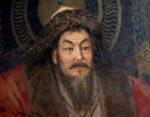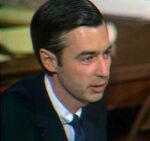Venezuela: what do you think when you hear that name? We’re guessing it’s something along the lines of “crime, economic collapse, and more crime.” A penniless petro-dictatorship long ruled by the United Socialist Party, Venezuela has become a byword for a failing state. Yet not so very long ago, it was a rich, robust democracy that was the envy of Latin America. So, how did we get from “rich past” to “current crisis”? What was the bridge connecting these diametrically opposed visions of Venezuela? The answer: The larger than life personality of a single man.
Hugo Chavez was a once in a generation politician. Coming to power as a populist outsider running against out of touch elites, he managed to oversee a wholesale reform of Venezuela, refashioning it in his own bombastic image. As president, he instituted unprecedented spending; gave freely to the poor; halved poverty rates, and reduced infant mortality. At the same time, though, he turned what was once a functioning democracy into an autocratic vanity project, one doomed to failure. A Robin Hood to some, a classic Latin American dictator to others, this is the life of Hugo Chavez, the man who made modern Venezuela.
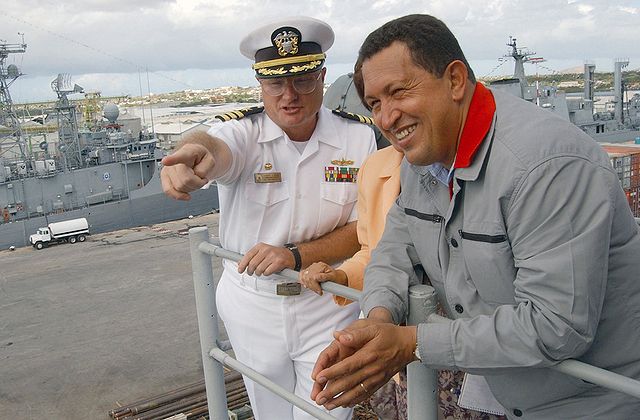
On Baseball and Suffering
If you were inventing the background story for a socialist revolutionary, you’d be hard-pressed to come up with anything better than Hugo Chavez’s actual life. Born on 28 July, 1954, Chavez was the real deal, a dirt poor kid born in a house with a literal dirt floor.
Not that Chavez grew up there. At a young age, he and his older brother Adán were sent to live with their grandmother when it became apparent their teacher parents couldn’t afford to feed them.
Still, that doesn’t mean Chavez’s early life was all hard knocks and misery.
As a boy, he was semi-famous around the outskirts of Barinas – a small city on the edge of Venezuela’s vast grasslands – for his ability to play baseball. This was the era of guys like Néstor “Látigo” Chávez (no relation), the Venezuelan pitcher who made it all the way to the San Francisco Giants, and Hugo was determined to follow in his footsteps.
But baseball wasn’t the only influence floating around Barinas at the time.
During the 1960s and 70s, Venezuela had to deal with a handful of Communist insurgencies. While these armed groups weren’t a patch on Colombia’s FARC or Peru’s Shining Path, they were still a fact of life. It’s said the teenage Chavez was intrigued by the guerillas who roamed the nearby countryside, even going so far as to read the works of Karl Marx.
Still, this was all just background to his continuing love affair with baseball.
Aged 17, Chavez left Barinas and enrolled in the military academy in Caracas. He’d head they had the best baseball coaches, and planned to train up then drop out as soon as he was good enough to play in the leagues.
But while his pitching might have been good for Barinas, it wasn’t good enough for Caracas.
At some point, the young poor from the dirt poor home was forced to abandon his baseball dreams. And that was how Hugo Chavez found himself stuck on a military track he had no interest in following, with a yearning for fame that could never be fulfilled.
He graduated in 1975 at the bottom of his class.
Immediately after, he joined the army and was packed off to fight a Maoist insurgent group in rural Anzoátegui. To say this was depressing would be a little like saying Schindler’s List is a trifle sad. Chavez hated his time in the army. He hated being in the middle of nowhere, he hated fighting the guerillas, and he hated the human rights abuses his unit committed.
Come 1977, he felt he had more in common with the guerillas than the army, and was on the verge of quitting when his older brother dropped an unexpected bombshell.
By now, Adán was a radical university professor. But no-one had realized quite how radical. In secret, Adán had been building links with the Communist insurgents. When he heard about his brother’s worries, he offered to arrange a meeting.
Not long after, Hugo Chavez finally met Douglas Bravo.
Despite having a name that sounds like military code for the letters D and B, Douglas Bravo was in reality a former guerilla now preaching the use of Venezuela’s oil wealth to build a socialist utopia. Together, he and Chavez formed the Bolivarian Movement 200 – a secret cell within the military dedicated to overthrowing the government when the time came.
Luckily for them, that the time was just around the corner.
Black Gold
We’re gonna pause and take a quick history lesson now; one that will hopefully explain exactly why a failed baseball player succeeded at taking over Venezuela.
To do that, we need to focus on two vital things in the country: politics, and oil.
The discovery of black gold in Venezuela took place in 1922. That year, a well in the Maracaibo basin suddenly began to gush 100,000 barrels a day. It was the start of a process that would eventually lead to Venezuela having the largest proven oil reserves on Earth.
It was also the start of a dangerously lopsided economy.
The damage really began in 1943, when the military rulers signed a law forcing all foreign oil companies to hand over a huge cut of their profits.
The revenue this generated was so vast that the government felt no need to further diversify the economy.
And that would leave Venezuela very vulnerable to price fluctuations in oil.
But a petro-economy alone does not make an unstable state. No, that took both oil-mania and some very unwise decisions taken at the top. In 1958, opposition leader Rómulo Betancourt became president, ending military rule.
Known today as the father of Venezuelan democracy, Betancourt has a lot going for him. But he was also operating in a time when Latin America was very unstable. Across the border, Colombia was just emerging from something known as La Violencia, a decade of undeclared civil war between the Liberal and Conservative parties that had killed over 150,000.
Needing to keep Venezuela’s parties from each other’s throats, Betancourt established the Puntofijismo – a power-sharing pact keeping the main parties perpetually in office. The Puntofijismo was great in that it led to stability, but less great in that it concentrated all power in the hands of a very narrow, Europeanized elite belonging to one of two parties.
As a result, if things ever went wrong, the people would know exactly who to blame.
The good times reached their peak in the 1970s, after the Arab oil embargo led to a surge in demand for Venezuelan crude. In 1975, then-president Carlos Andrés Pérez nationalised oil production, and it seemed the money would never stop rolling in. But that’s the trouble with a non-diversified economy. All it takes is a single black swan event, and everything can come crashing down.
Fittingly, Venezuela’s black swan took the form of oil prices.
In 1981, a so-called “oil glut” caused a global price crash. This kneecapped the Venezuelan economy. By 1989, the country was in crisis. President Perez took a loan from the IMF, promising to end food and fuel subsidies as a precondition.
It’s at this point that the other bird came home to roost.
Thanks to the Puntofijismo, Venezuela’s elites were now so totally removed from their struggling countrymen that they didn’t realize they needed the food subsidies to survive. So when the government suddenly took those subsidies away…
Well, let’s just say the masses didn’t take kindly to it.
The Caracazo erupted on February 27, 1989. A weeklong orgy of rioting in Caracas, it devastated the city. Although the government managed to retake the streets, they only did so at great cost. By one estimate, security forces killed around 3,000 rioters.
In the aftermath, a huge anger began to swell, against the elites, against the Puntofijismo.
In the military, this anger found an outlet.
From that year, Hugo Chavez and Douglas Bravo had no problems recruiting soldiers into their revolutionary cell. By the time the 90s got underway, they had their own private army.
“Por Ahora”
On February 4, 1992, regular broadcasts on Venezuelan TV were interrupted by a breaking news report. A military coup was underway. As tanks rolled up the steps of the presidential palace, stories poured in of armed units seizing the cities of Maracaibo and Valencia.
For a moment, it really looked like the plotters would take power.
But only for a moment. Somehow, President Pérez managed to escape capture. He went on TV and called for people to defy the plotters. Shortly after, the tanks stopped their assault. The leader of the coup cut a deal to stand down, provided he was allowed to go on live TV and ask his followers to lay down their arms.
That very night, Venezuela got its first glimpse of Hugo Chavez.
Despite having just led a failed coup, Chavez seemed calm before the cameras. Even amused.
In a short speech, he declared:
“Comrades: Unfortunately, for now, the objectives that we had set for ourselves have not been achieved… new possibilities will arise again.”
The keywords there were “for now”, or por ahora in Spanish.
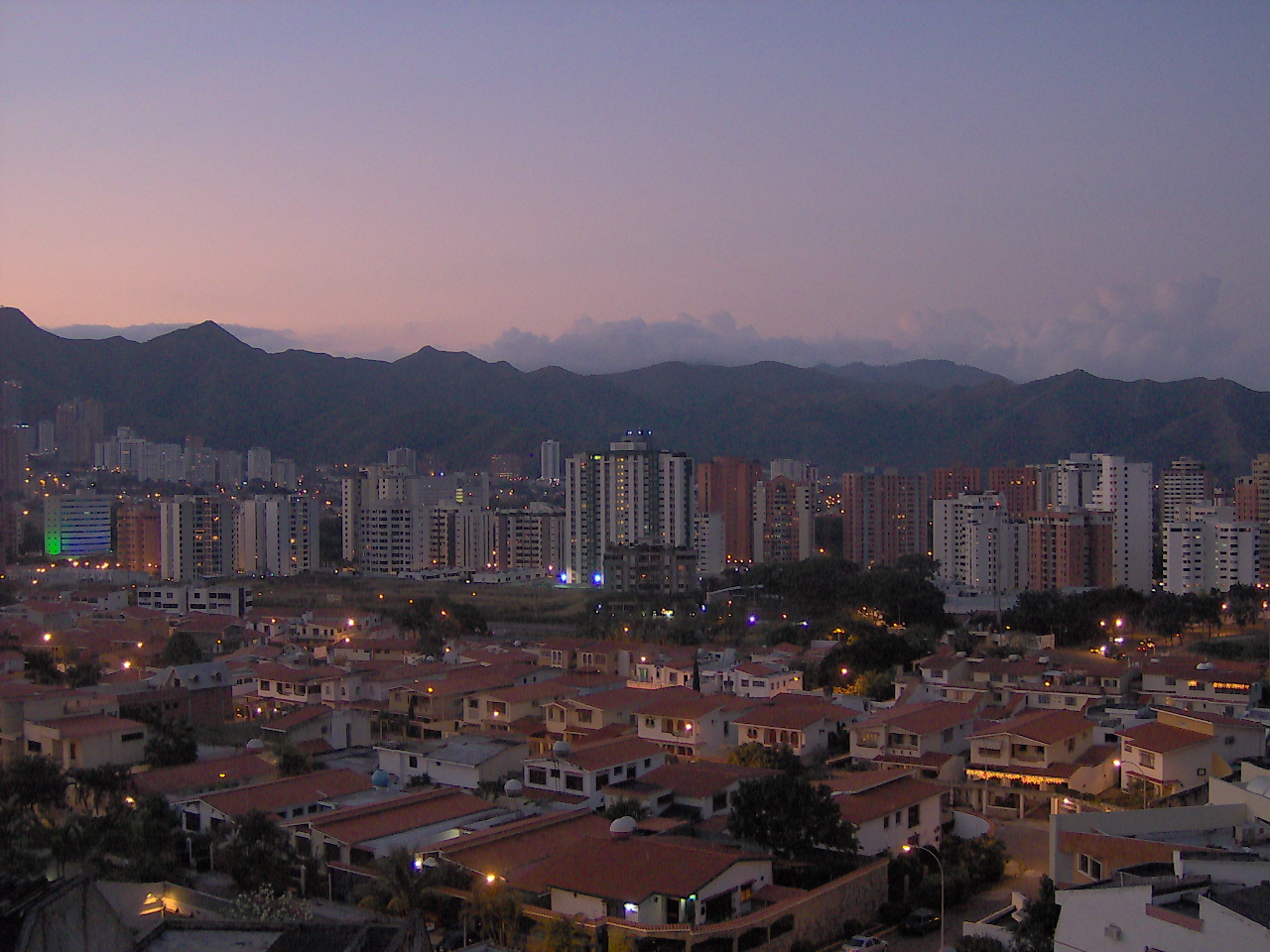
Coming from this confident officer, this soldier who looked not like the Europeanized elites, but like the mixed-heritage mass of Venezuelans, those two words didn’t sound empty. They sounded like a promise.
In the aftermath of the coup, Chavez was thrown in prison. But he wouldn’t be there long.
The coup attempt had come at a time when memories of the Caracazo were still fresh, when the ruling classes were trusted about as much you’d trust a babysitting service run by Jared Fogle. In Chavez, Venezuelans didn’t see a renegade army officer. They saw a hope for their future. Next year, 1993, President Perez was impeached for embezzlement and removed from office. When Rafael Caldera took office in 1994, he issued a blanket pardon to the coup plotters.
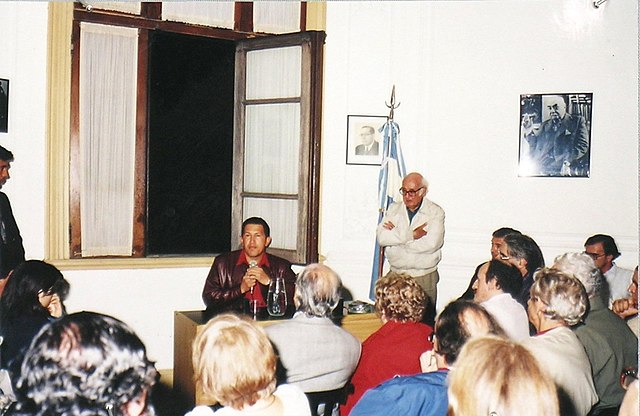
On his release, Chavez became a celebrity; the soldier who’d taken a stand against corrupt Perez.
During a 100 day tour of Venezuela, the former plotter met thousands of ordinary people, and everywhere he went, he took his promise: por ahora.
Things were bad, but only for now, he seemed to be saying. Trust me, new possibilities will arise again. By the time the 1998 elections rolled around, Chavez was the most popular man in the country.
Founding a party known as the Movement of the Fifth Republic he ran for president.
It was perfect timing.
Chavez painted himself as someone neither left nor right, simply an outsider who would drain the swamp in Caracas, and shake up the monied two party system that ignored ordinary voters. The establishment played right into his hands, putting up a foreign-educated candidate who might as well have campaigned from a literal ivory tower.
The results were unambiguous.
On December 6, 1998, Chavez won the presidency, carrying 56% of the vote. On February 2, 1999, he was inaugurated on a platform of sweeping change. The triumph the failed baseball star had dreamed of when he launched his coup just seven years earlier was finally here. Por ahora was gone. It was merely ahora, the time was now.
No-one watching Chavez’s inauguration on TV could’ve guessed it, but a historic moment had just taken place.
When Hugo Chavez finally left office in the back of a hearse, he would leave behind a country that had changed forever.
Aló Presidente
When Chavez took office, he was more popular than any of today’s populists could dream of being. Across 1999, his approval rating hovered around a staggering 80%. He was helped by a tranche of reforms, including Plan Bolivar 2000, a kind of Venezuelan New Deal that poured money into infrastructure spending and building affordable homes.
But this populism masked deeper machinations.
As president, Chavez was able to call a referendum on rewriting the constitution. With people still pissed at Venezuela’s elites, he won by a wide margin. In the vote deciding who would do the rewriting, Chavez again carried the day. The result was a constitution rewritten to give the president six year terms and allow immediate reelection.
It also abolished the Senate, and forced every elected official to run again for office in 2000 or lose their seats. When Chavez put this to referendum on December 15, he won again.
It was the classic political trick of ramming through major changes while you still have that honeymoon glow, before people start to seriously question your motives. And it worked. When the “mega election” was held in July, 2000, Chavez won a new, six-year term; and a new national assembly was returned that held a pro-Chavez majority.
Not long after, the Supreme Court was quietly stuffed with pro-Chavez judges.
But while Chavez was consolidating his power, life in Venezuela was stubbornly refusing to improve. In 1999, the economy had shrank by 7%. The problems that had led to Chavez’s own, 1992 coup still hadn’t gone away.
And Chavez wasn’t the only former officer willing to change the leadership through force.
Early warning signs came in 2001, when Chavez unveiled a package of executive decrees designed to wildly redistribute land and wealth in Venezuela. That turned the business community and the upper classes against him. Then he started cozying up to Fidel Castro’s Cuba, alienating the middle class.
Come 2002, Chavez’s support was tanking. No-one even seemed to be sure who he was ruling for, apart from himself.
It was at this point el Presidente did something very stupid.
That year, Chavez announced moves that would effectively place the state oil company under the control of his own party.
The reaction was swift and violent.
On April 11, nearly a million people marched on the president’s palace in Caracas to protest. Instead they were met by Chavez-loyal gunmen, who opened fire. It was the Caracazo all over again. An unknown number of people died.
That same day, the military removed Hugo Chavez from power.
So, you’re not an idiot. You can see this video still has about half its runtime left. The question then, is how did Chavez survive being removed in a coup?
The answer: sheer luck.
The same day Chavez was arrested, the military installed businessman Pedro Carmona as head of an interim government. But Carmona seems to have mistaken this for a blank check, and immediately suspended the constitution and dissolved the government.
In response, the military appears to have been all like “oh crap, this guy’s even crazier than Chavez,” and quickly hit the undo button.
Carmona was himself deposed, and Chavez returned to the president’s palace by the very army that had arrested him.
After a mere 47 hours, Hugo Chavez was back in control. At first, he was contrite, promising more compromise in the future, accepting that he’d gone too far.
But this is Chavez, remember? The guy of por ahora.
All he’d learned from the 2002 coup was that the time wasn’t ripe to launch his complete takeover of the government. But when the time came, he would be more than ready.
Beauty and Madness
The moment the Carmona coup collapsed, Venezuela became a country bitterly divided into two camps: those who loved Chavez, and those who spat at the very mention of his name.
Initially, the second camp was biggest.
Chavez was just too openly craving power for power’s sake. He even fired striking workers who opposed him and replaced them with nonunion labor – a move way more “capitalist roader” than “socialist revolutionary”.
But then Fidel Castro had a quiet word in Chavez’s ear, and everything changed. The Bolivarian Missions – named after Independence hero Simon Bolivar – were simple in their genius. Government bodies funded by rising oil prices, they were charged with going into the slums of Caracas, and improving life for the poor.
There were adult literacy programs. Free community healthcare. Subsidized food banks. Free houses for the destitute.
“Well, OK,” you might be thinking, “but that’s just the very poorest. They surely can’t be enough voters to keep Chavez in power.”
But the thing is, they were.
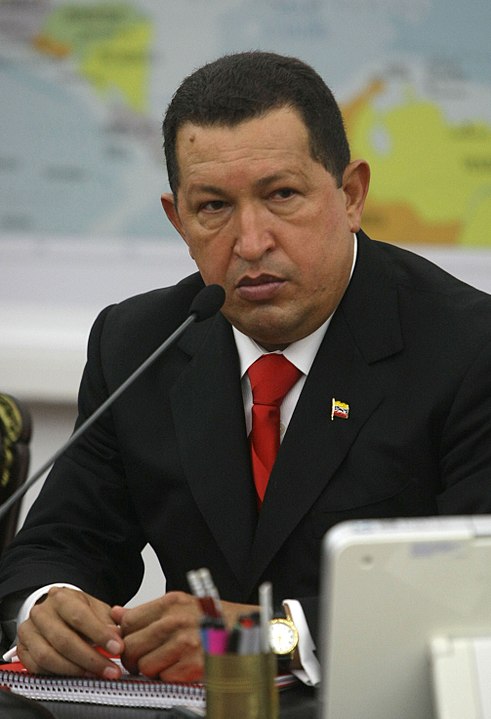
Hugo Chávez seated behind a microphone in 2010
CC BY 4.0
File:Hugo Chávez (02-04-2010).jpg
Created: 2 April 2010
About Media Viewer
Remember the boom times under the Puntofijismo, when all that oil money came rolling in? Well, it had only come rolling in for those at the top. By the time Chavez took power, a full 50% of Venezuelans were living in poverty, ignored and forgotten by the elites.
With the Bolivarian Missions, someone was finally paying attention to them. It’s here we can see one of the fascinating contradictions of Hugo Chavez.
On the one hand, the Missions were clearly cynical, organized to get masses of voters on his side. On the other hand, the Missions really did work. Millions were lifted out of poverty. Millions were given opportunities long denied.
Imagine for a moment that you were a Caracas slum-dweller who’d seen her lifestyle remain resolutely third world, even as the elites enjoyed unparalleled luxury.
Now imagine a government suddenly comes along that can get rid of your dirt floor, that can give you drinking water, that can give your son an education.
Would you really refuse to vote for the man who gave you all this? The popularity boost from the Missions allowed Chavez to survive a 2004 recall referendum. By 2005, he was popular enough that he launched a program of land expropriations aimed at large estates. That same year, laws were passed effectively ending media freedom.
Come 2006, the opposition was boycotting elections. So pro-Chavez politicians effectively won every seat going, and Chavez himself won reelection as president.
Chavez’s last great move that year was to found the United Socialist Party of Venezuela, effectively merging nearly all the country’s leftwing parties with his own.
The president now had a stranglehold on power in Caracas. His opponents were down, the masses in love with him, and all voices of moderation silenced.
He was effectively a God, a man upon whose shoulders all power in his nation rested.
It’s at this point that things began to get a little weird.
The Madman
One of the interesting things about Chavez we can only see with hindsight is that he prefigured today’s populists. Like many of those running the world now, Chavez scorned normal media channels, instead preferring to communicate directly with his followers.
He was obsessed with touring the country and giving “speeches” that were rambling, folksy, unscripted, and often fantastically vindictive. He developed a way with insults, once calling George W. Bush “more dangerous than a monkey with a razor blade”.
He dabbled in conspiracy theories, speculating to enraptured audiences that the moon landings were faked, that secret US superweapons caused earthquakes. It was a technique we’re all too familiar with in the present. The use of bombast and taboo-breaking to distract attention from the seriously evil crap you’re doing.
But while today’s populists have echoes of Hugo Chavez, the original was just lightyears beyond anything Donald Trump, Boris Johnson, or even Rodrigo Duterte could dream of.
By the late 2000s, Chavez had so effectively become the focal point of Venezuelan governance that he was followed everywhere by cameras, his loosest off-the-cuff remarks translated into instant policy as if he were some medieval European king.
There was the time he set the nations clocks back half an hour on a whim. Or the time he nearly declared war on Colombia live on air. When not making laws up on the fly, he was launching into seven hour rants on his weekly show Alo Presidente, covering everything from whiskey to cosmetic surgery.
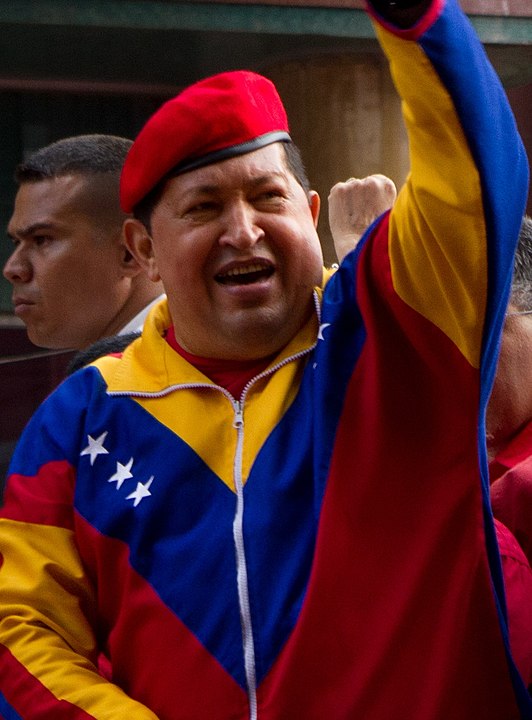
It’s tempting to think that, post-2006, Chavez simply lost it. Or that he was merely another Gadaffi – a weirdo at heart who finally let his weirdness come out.
But there’s another view, one summed up by the former editor of the news site Caracas Chronicles:
“In Venezuela, these outbreaks of weird had a different meaning: as visible displays of his (Chavez’s) untouchability. There’s an ineffable creepiness to a society where the leader never pays a political price for what he says, no matter how plainly crazy or illegal it may be.”
In other words, Chavez only acted so crazy because he knew he could get away with it. And he wanted you to know he could get away with it, too. Despite all the outward trappings of a Gaddafi-style dictatorship, though, we should be careful to note that Chavez wasn’t actually a dictator. At least, not in the traditional sense.
In his 14 years in office, he never once rigged an election. He won nearly every vote he took part in, and he won it fair and square.
On the other hand, when he did lose, he found… let’s say “creative” ways around the result. In 2007, for example, Chavez narrowly lost a referendum on greatly expanding his powers. The next day, billboards appeared across Caracas with the slogan, por ahora.
It was a promise. One that Chavez followed through on.
Over the next three years, all the failed referendum’s provisions were passed, one way or another. Either by breaking them up and holding separate referendums, or by making the national assembly pass laws, or by using executive orders.
By 2010, Chavez had everything he’d asked voters for back in 2007.
So, yeah, Chavez may have never become a dictator in a literal sense, but nor was he a democrat. More a strongman who used democracy to do undemocratic things. Come 2010, Chavez had secured the constitutional right to keep running for new presidential terms indefinitely.
To anyone watching Venezuela at the time, it seemed like the 56-year old Chavez could conceivably keep ruling for another three decades.
Little did anyone know he’d be gone in barely a tenth of that time.
Adiós, Presidente
The first signs of the illness that would kill Hugo Chavez appeared in June of 2011. That month, el Presidente was forced to cancel a meeting of Latin American leaders and fly to Cuba for emergency surgery.
Not long after, he informed his public that he’d been diagnosed with cancer.
At first, it seemed the treatments in Cuba were a success. Come 2012, Chavez was still feeling strong enough to run in presidential election and win a third term. But it was just a smokescreen. Deep down, Chavez knew what was happening. And he began to make preparations.
On October 11, 2012, Chavez abruptly appointed former bus driver Nicolas Maduro as his vice president.
Maduro had been in government for a while. But he was an outsider to its real circles of power, and singularly uncharismatic to boot. It’s been assumed Chavez appointed him because he was the most dogmatic, the most likely to carry on the Bolivarian Revolution if something were to happen to Chavez.
Not long after, it did.
In January, 2013, Chavez was so ill that he missed his own inauguration, leading to confusion as to whether he was even still legally president. But that pretty soon became a moot point.
On March 5, 2013, Hugo Chavez died of cancer.
Less than a month later, a special election was held to decide who would replace el Presidente after 14 years. Despite the backing of all the media, and despite the goodwill the masses still felt towards Chavez, his vice president Nicolas Maduro barely squeaked home with a mere 50.6% of the vote.
Yet squeak home Maduro did. And the rest is just so much painful history.
Today, it’s easy to look at the mess that is Venezuela and judge Hugo Chavez harshly. In many ways his revolution really was a catastrophe. Crime soared under his watch, turning Caracas from a relatively safe city into one of the most dangerous capitals on Earth.
The economy, too, was as neglected as during the Puntofijismo.
Like the elites before him, Chavez simply took the oil money without thinking, leaving behind an economy so dangerously unbalanced that even basic foodstuff Venezuela could produce domestically had to be imported.
He wracked up huge debt with China, even as he chased the educated middle classes away, hundreds of thousands of whom moved abroad, taking their business skills with them.
So, yes, there are a whole bunch of reasons you can blame modern Venezuela on Chavez’s rule. Many reasons why you can see his legacy as nothing but poison.
But that’s not the whole picture.
For all the awful stuff Hugo Chavez did, it’s worth remembering one salient fact.
The people really did love him. Not in the way North Koreans are forced to “love” Kim Jong-Un at gunpoint; but a real, deep love that came from Chavez being the only man to ever listen to them. And Chavez earned this love. He lifted millions out of poverty. He gave the forgotten masses paths to education, means to improve their lives in ways they’d never dreamed.
In another time, with a different personality, Hugo Chavez could’ve been remembered as Venezuela’s Franklin D Roosevelt – the first president to speak for the common man.
Sadly, we don’t live in that time, and Chavez didn’t have a better personality.
What he did have, though, was an undeniable historic impact. If history is simply the story of men and women who changed the world around them, then Hugo Chavez will always remain one of Venezuela’s most important chapters.
For better and for worse, he changed his nation more profoundly than anyone likely will again for centuries.
Sources:
Britannica: https://www.britannica.com/biography/Hugo-Chavez
Biography: https://www.biography.com/political-figure/hugo-chavez
Surprisingly damning obituary by the Guardian: https://www.theguardian.com/world/2013/mar/05/hugo-chavez
The pro-Chavez view: https://www.thenation.com/article/archive/legacy-hugo-chavez/
Atlantic on the contradictions and repressions of Chavismo: https://www.theatlantic.com/international/archive/2013/03/chavez-wasnt-just-a-zany-buffoon-he-was-an-oppressive-autocrat/273745/
The road to Chavez: https://www.britannica.com/place/Venezuela/The-Andinos#ref219053
Venezuela timeline: https://www.cfr.org/timeline/venezuelas-chavez-era
1992 coup: https://america.cgtn.com/2018/05/16/venezuela-1992-the-rise-of-hugo-chavez
Post-Chavez, the timeline to collapse: https://www.history.com/news/venezuela-chavez-maduro-crisis
Hugo Chavez and baseball: https://www.pri.org/stories/2013-03-06/hugo-chavez-baseball-career-gave-way-politics
Legacy and effect on today’s situation: https://foreignpolicy.com/2018/12/06/chavezs-real-legacy-is-disaster/
Chavez funeral: https://www.bbc.com/news/world-latin-america-21712646


